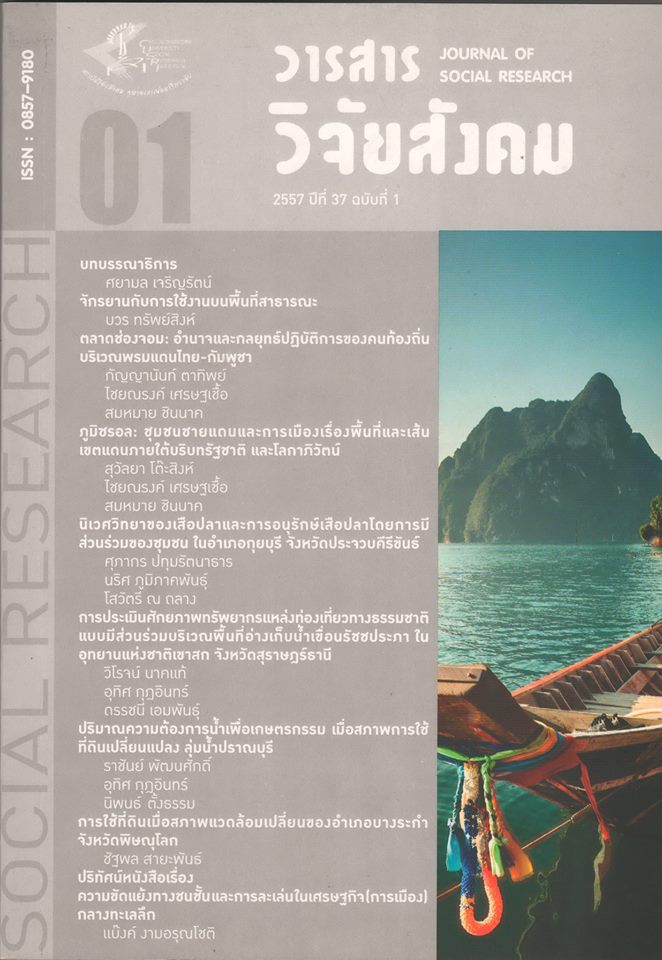ตลาดช่องจอม : อำนาจและกลยุทธ์ปฏิบัติการของคนท้องถิ่น บริเวณพรมแดนไทย-กัมพูชา
Main Article Content
บทคัดย่อ
บทความนี้อธิบายถึงตลาดช่องจอม (Chongchom Market) บริเวณชายแดนไทย–กัมพูชา ภายใต้การพัฒนาอนุภูมิภาคลุ่มน้ำโขง (The Mekong Sub-region หรือ GMS) โดยมีประเด็นสำคัญสามประการ ประการแรกเป็นการอธิบายถึงการเปลี่ยนแปลงนิยามความหมายพื้นที่ชายแดนไทย-กัมพูชา บริเวณตลาดช่องจอม ประการที่สองเป็นการอธิบายให้เห็นอำนาจและปฏิบัติการของอำนาจที่ชายแดนไทย–กัมพูชา บริเวณตลาดช่องจอม ประการสุดท้ายเป็นการอธิบายวิถีชีวิตของคนท้องถิ่นบริเวณตลาดช่องจอม ภายใต้การนิยามความหมายพื้นที่ชายแดนไทย-กัมพูชา และปฏิบัติการของฝ่ายต่างๆ
บทความนี้ใช้แนวคิดกระบวนการผลิตสร้างและการเปลี่ยนแปลงความหมายของภูมิทัศน์ชายแดน แนวคิดบรรดาอำนาจท้องถิ่น (Local power) และแนวคิดกลยุทธ์ปฏิบัติการในชีวิตประจำวัน เข้าช่วยอธิบาย โดยเก็บข้อมูลในตลาดช่องจอม ระหว่างปี 2554-2556 พบว่าภายใต้การพัฒนาอนุภูมิภาคลุ่มน้ำโขงได้มีการให้ความหมายพื้นที่ชายแดนไทย-กัมพูชา ว่าเป็นพื้นที่เศรษฐกิจที่เชื่อมต่อกับภูมิภาค ภายใต้การนิยามนี้มีบรรดาอำนาจฝ่ายต่างๆโดยเฉพาะบรรดาอำนาจท้องถิ่นได้กระทำและกดทับคนท้องถิ่น ทำให้คนท้องถิ่นสร้างปฏิบัติการที่หลากหลายเพื่อต่อสู้และต่อรองกับกลุ่มอำนาจต่างๆ
บทความนี้เสนอว่าการผนวกแนวคิดภูมิทัศน์ชายแดนเข้ากับแนวคิดบรรดาอำนาจท้องถิ่น และแนวคิดปฏิบัติการในชีวิตประจำวันได้ทำให้เห็นความซับซ้อนของอำนาจที่ชายแดนและการต่อสู้ดิ้นรนของผู้คนบริเวณชายแดนไทย-กัมพูชาได้เป็นอย่างดี
ChongchomMarket: Power at Thai-Cambodian Border and Tactics of Everyday Life Practice
This article intends to give a description of Chongchom Market along the Thai-Cambodian border, in the context of the Mekong Regionalization. The three keystones of the descriptive explanation comprise: the definition change; a recognition of powers and its practices; and local people's livelihoods at the border. Those explanations are defined through the meaning of the area along Thai-Cambodian border and practices among various parties.
The conceptual framework in this exploratory description derives from a process of establishment and change in the redefinition of border landscape, local powers, and tactics in practical life practice. The data collection was conducted along Chongchom Market from 2011 to 2013. According to the data, it reveals that the Thai-Cambodian border through the Greater Mekong Sub-region or GMS is defined as an economic zone in connection to the regions. Due to such definition, various powerful parties, particularly local powers are enacting through such definition. Subsequently, the local people are refrained against and negotiate with those various groups of power.
Consequently, this article reveals that an assimilation of the concepts among the border landscapes, local powers, and tactics in everyday life practice practices obviously show a complexity of the powers along the borders and a struggle of the people along Thai-Cambodian border
Article Details
1) บทความนี้เป็นลิขสิทธิ์ของสถาบันวิจัยสังคม จุฬาลงกรณ์มหาวิทยาลัย แต่ความคิดเห็นและเนื้อหาเป็นของผู้แต่ง
2) ทัศนะและความคิดเห็นที่ปรากฏในบทความในวารสารวิจัยสังคมและปริทัศน์ สถาบันวิจัยสังคม จุฬาลงกรณ์มหาวิทยาลัย ถือเป็นความรับผิดชอบของผู้แต่งบทความนั้น และไม่ถือเป็นทัศนะและความรับผิดชอบของกองบรรณาธิการวารสารวิจัยสังคมและปริทัศน์ สถาบันวิจัยสังคม จุฬาลงกรณ์มหาวิทยาลัย กองบรรณาธิการไม่สงวนสิทธิ์ในการคัดลอก แต่ให้ระบุถึงการอ้างอิง


